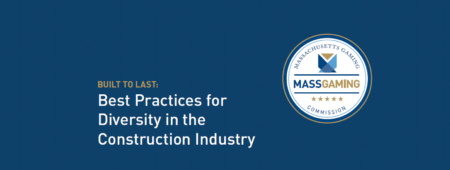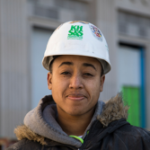The Massachusetts Gaming Commission Issues Best Practices Report for Diversity in the Construction Industry
- October 09, 2019
- by MGC Communications
- 0 comments

 Meet Katurah Holness. Prior to becoming an apprentice carpenter, Katurah was homeless, staying at a veteran’s shelter and driving for a ride-hailing company. Katurah had spent five years in the Air Force but struggled to find steady work after she left the service. One day Katurah gave a ride to a union carpenter who suggested she might consider joining the union. She dropped off her fare and headed straight to the union hall to learn how to apply. Several months later, Katurah became an apprentice and was hired to help build MGM Springfield.
Meet Katurah Holness. Prior to becoming an apprentice carpenter, Katurah was homeless, staying at a veteran’s shelter and driving for a ride-hailing company. Katurah had spent five years in the Air Force but struggled to find steady work after she left the service. One day Katurah gave a ride to a union carpenter who suggested she might consider joining the union. She dropped off her fare and headed straight to the union hall to learn how to apply. Several months later, Katurah became an apprentice and was hired to help build MGM Springfield.
The Legislature legalized casino gaming with the intention of generating jobs and business opportunities for Massachusetts residents. The legislation set clear priorities of establishing a diverse and skilled workforce and providing opportunities for minority, women and veteran-owned businesses.
“Expanded Gaming is about connecting people with opportunity. Personal stories of triumph, like that of Katurah Holness, capture the true intent and spirit of the gaming law,” said MGC Director of Workforce, Supplier and Diversity Development Jill Griffin.
On Tuesday, October 8, during a Diversity Summit at Smith College in Northampton, the Massachusetts Gaming Commission led a robust discussion about tactics to enhance diversity and incorporate inclusion principles on construction job sites. At the summit, key stakeholders shared promising practices and proven strategies for increasing the number and percentage of women, minority individuals, and veterans participating as labor and suppliers on development projects.
Also, the MGC issued a report entitled “Built To Last: Best Practices for Diversity in the Construction Industry.” The MGC commissioned the report to summarize and share the strategies and lessons learned during casino development to achieve workforce and contractor diversity. The report captures the insights and reflections from more than 30 stakeholders, including gaming licensees, construction companies, unions, worker advocacy and trade entities, community representatives, and business advocacy and certificate organizations.
According to the report, “To achieve diversity in the casino development projects, MGC and its partners created and implemented a robust series of strategies that address elements from all three sides – demand, supply and monitoring. The Access and Opportunity Committee (AOC), convened by the MGC, is the cornerstone of this strategy involving multiple stakeholders in transparent monitoring of progress toward goals and collaborative problem solving.”
“The MGC enthusiastically embraces our mandate to create a gaming industry that reflects the diversity of our great Commonwealth. Our commitment to building a diverse and inclusive new industry has been consistently met with unyielding determination from our many partners and stakeholders. We are tremendously grateful to the AOC members for their substantial contributions and collective expertise,” said Commissioner Bruce Stebbins.
The research report further notes that the approach used for casino development was inspired by important foundational work from organizations such as the Policy Group on Tradeswomen Issues, the UMass Building Authorities’ Access and Opportunity Committee, and others.
Massachusetts casino licensees regularly met and exceeded diversity goals during the construction phase. MGM Springfield had 2.7 million work hours, concluding with 7.53% women work hours, 22.49% people of color work hours, and 8.33% veteran work hours. Encore Boston Harbor had the distinction of hiring the most tradeswomen in the history of all known construction projects, achieving 6.9% women work hours, 25% people of color work hours, 6.2% veteran work hours and 18% of the contracts went to diverse and veteran businesses.
“When construction sites reflect the diversity of the Commonwealth, infrastructure turns buildings into bridges by ensuring economic opportunity for all. We hope that our experience can be used and built upon for future developments. As construction continues to boom statewide, we are pleased to have the opportunity to collaborate and contribute to a regional model that represents and celebrates our shared commitment to diversity and inclusion,” said MGC Chair Cathy Judd-Stein.
About MassGaming
The mission of the Massachusetts Gaming Commission is to create a fair, transparent, and participatory process for implementing the expanded gaming law passed by the Legislature and signed by the Governor in November 2011. In creating that process, the Commission will strive to ensure that its decision-making and regulatory systems engender the confidence of the public and participants, and that they provide the greatest possible economic development benefits and revenues to the people of the Commonwealth, reduce to the maximum extent possible the potentially negative or unintended consequences of the new legislation, and allow an appropriate return on investment for gaming providers that assures the operation of casino-resorts of the highest quality. For more information on MGC, please visit MassGaming.com or connect and share on Twitter (@MassGamingComm) or Facebook www.facebook.com/MAGamingComm.